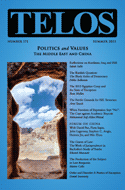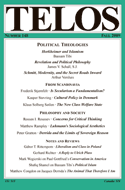 It is this article’s assertion that calls for academic boycott contradict with the classic rationales of the right to free expression and with the peculiar features of the right to academic freedom. Freedom of expression is about developing a dialogue between two opposing opinions, wherein each claims to be the right one. Calls for academic boycott promote monologues rather than dialogues, thus creating the illusion that they represent the truth because they are not challenged. Moreover, protecting the right to academic freedom of individual academics is necessary for their fulfillment as researchers who can respect academic standards exclusively rather than institutional mandates. The self-fulfillment for an individual academic is enacted through the ability to convey messages that can compete against other views.
It is this article’s assertion that calls for academic boycott contradict with the classic rationales of the right to free expression and with the peculiar features of the right to academic freedom. Freedom of expression is about developing a dialogue between two opposing opinions, wherein each claims to be the right one. Calls for academic boycott promote monologues rather than dialogues, thus creating the illusion that they represent the truth because they are not challenged. Moreover, protecting the right to academic freedom of individual academics is necessary for their fulfillment as researchers who can respect academic standards exclusively rather than institutional mandates. The self-fulfillment for an individual academic is enacted through the ability to convey messages that can compete against other views.
|
As an occasional feature on TELOSscope, we highlight a past Telos article whose critical insights continue to illuminate our thinking and challenge our assumptions. Today, Michael Millerman looks at Frederik Stjernfelt’s “Secularism is Fundamentalism! The Background to a Problematic Claim,” from Telos 148 (Fall 2009). Frederik Stjernfelt and Jens-Martin Eriksen’s The Democratic Contradictions of Multiculturalism is also available from Telos Press in our online store. The following talk was presented at the Central European Forum, held in Bratislava, on November 16–19, 2011. Telos Press looks forward to publishing Democratic Contradictions of Multiculturalism by Jens-Martin Erikson and Frederik Stjernfelt, scheduled to appear in March 2012. “The language of fear” is the headline of this section at the Central European Forum. My contention is that fear is best fought in open democratic debate. Yesterday, Pascal Bruckner said that Europe did not sufficiently stand up for its own core values. One, central, of those values is free speech. As I cannot address all problems at the same time, let me on focus upon this particular problem in this context. Free speech is a European heritage: originating in Holland and England, and first formalized in Denmark, France, and the United States in the second half of the 18th century. But a major contemporary problem in Europe is what could be called the “legislation of fear,” the increasing belief that unwelcome utterances are best fought by means of legislation, prohibition, criminalization—in short, by the curtailment of free speech. The most terrible aspect about this development is that it plays into the hands of terrorists wishing to fight free speech. Let me mention but two examples from Europe in the recent weeks. The German so-called “Döner killings” of Turkish immigrants were finally resolved and a neo-Nazi group in Zwickau claimed responsibility. In their posthumous manifesto, the two central members claimed they fought, among other things, for the radical change of freedom of opinion. In Paris, unknown arsonists burned down the offices of the satirical weekly Charlie Hebdo—no doubt because of the weekly’s focus upon the current development of sharia policies for Tunisia and Libya. So both the neo-Nazi right wing and the islamist right wing agree upon the fight against free speech as a common denominator. Telos Press looks forward to publishing Democratic Contradictions of Multiculturalism by Jens-Martin Erikson and Frederik Stjernfelt, scheduled to appear in March 2012. It is with an increasing feeling of sickness that I follow the incidents around the Parisian weekly Charlie Hebdo and its special issue on sharia prompted by the political developments in Libya and Tunisia. Early in the morning of November 2nd, a window was broken and a Molotov cocktail thrown into the premises of the weekly which burned out. By sheer luck, nobody was hurt. In the expectedly strong reactions against this attack on free speech, disturbing voices and events intervene. Initially, the asylum offered to the publishers by the daily Libération constituted an encouraging event—one voice supporting the other against threats to free speech. |
||||
|
Telos Press Publishing · PO Box 811 · Candor, NY 13743 · Phone: 212-228-6479 Privacy Policy · Data Protection Copyright © 2025 Telos Press Publishing · All Rights Reserved |
||||
 What Leo Strauss demonstrated in his studies on the foundations and crisis of liberalism—an achievement that continues to bring both honor and infamy to his name—recurs in the guise of an unsolved problem in both the popular press and in learned company as a debate over the question of whether secularism is what it ostensibly opposes: a rigid fundamentalism. In these circles, the question is provoked less by purely theoretical considerations than by such utterances in the public sphere as are bound to infuriate a sect’s opponents, or confirm them in their suspicions: the
What Leo Strauss demonstrated in his studies on the foundations and crisis of liberalism—an achievement that continues to bring both honor and infamy to his name—recurs in the guise of an unsolved problem in both the popular press and in learned company as a debate over the question of whether secularism is what it ostensibly opposes: a rigid fundamentalism. In these circles, the question is provoked less by purely theoretical considerations than by such utterances in the public sphere as are bound to infuriate a sect’s opponents, or confirm them in their suspicions: the 

